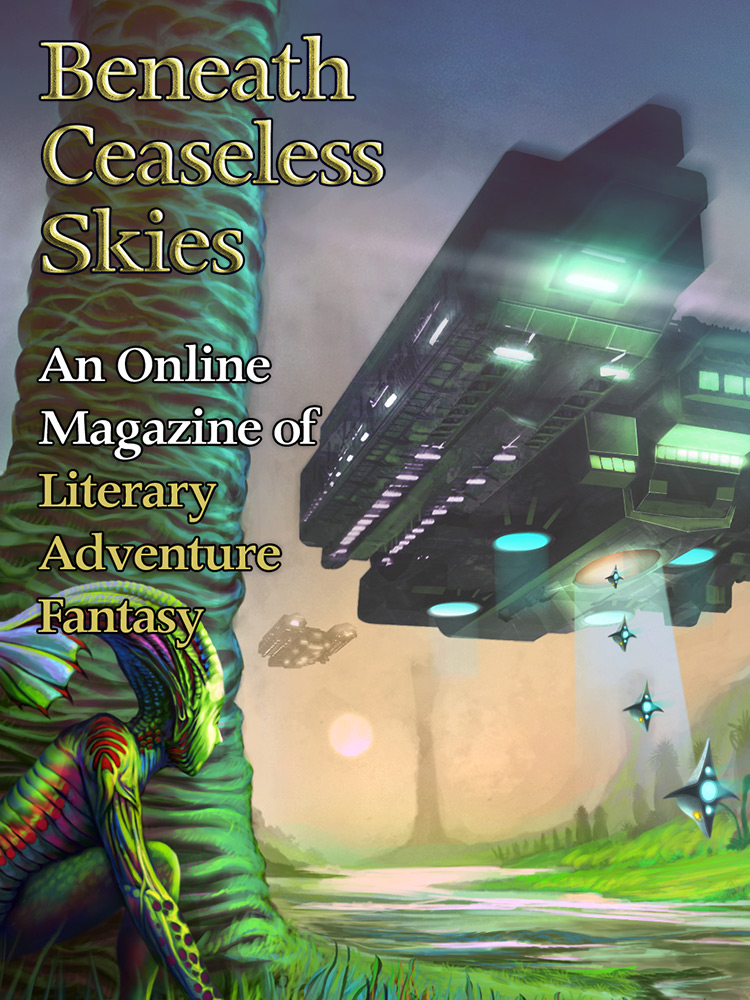 Beneath Ceaseless Skies #143, March 20, 2014
Beneath Ceaseless Skies #143, March 20, 2014
Reviewed by John Sulyok
“The Bonedrake’s Penance” by Yoon Ha Lee
How many of us truly take the time or interest in our parent’s pre-us lives to ask what they did or how it led them to where they are now? For many, it’s enough to be content with the coddling, worrying, and unspoken care parents are wont to dole out. But perhaps we don’t ask, because we don’t want to know, because it may dissipate the aura we’ve chosen to surround them with.
There is a fortress, “a repository of sorts, a museum” with two inhabitants: a mother and her surrogate daughter. The daughter is human, her mother is a bonedrake—literally a shape-changing drake made of bone. Their relationship is, however, quite normal, with much of their time spent baking cupcakes. But the bonedrake is also a curator, hosting emissaries who bring artifacts to ensure the recording of certain historically significant events in their civilizations. One visit in particular, with a robot called Hauth, would put their relationship to the test simply because he had answers to questions the girl hadn’t asked or hadn’t received answers to. Answers she may not want to hear.
Although the underlying thread in “The Bonedrake’s Penance” may be in tune with many readers, the writing may not. Yoon Ha Lee has written a long story, using many words, but has managed to say very little. The vast majority of the action does little to build toward the climax, and little to build a believable world and characters. It’s a work that could have used some fine tuning, something that could tie the beginning to the end in a meaningful way.
“Sekhmet Hunts the Dying Gnosis: A Computation” by Seth Dickinson
Very rarely does a title capture the essence of a story as well as “Sekhmet Hunts the Dying Gnosis: A Computation”. If you have any question as to what the title means, you’ll have questions about what the content means as well.
To be sure, the story about the gods Sekhmet and Set is prose, but functions as poetry. Uncommon words are used to form uncommon sentences, leading to the literary equivalent of “spaghetti code,” something that may work, but requiring more effort to decipher than is probably worth the time.
Ultimately, whether or not you enjoy this one may depend on which side of this line you fall on: an understandable plot or writing that sounds good to your inner poet.
“The Goddess Deception” by Dean Wells
Kavita Patel has gone missing. She and a team of Makers that she “was assigned to landed on Gamhanride to repair a series of ansible propagators.” Now, Special Agent Romulous Caul—part man, part machine—and his partner, Special Agent Plio Plio Ah—a shapeshifter—are sent on a search and rescue mission to recover Kavita. Their search takes them through various landscapes and unexpected twists, leading to a much larger plot.
“The Goddess Deception” is part steampunk, part fantasy, and either part science fiction or alternate history (or both). The world-building is done mostly on a superficial level, with many place names, culturally significant terms and phrases, creatures and species, and devices, vehicles, and weapons. Unfortunately, the dozens of unfamiliar terms do less to build the setting than they do to alienate the reader. The story reads like it belongs to a larger series that the reader is already familiar with. The plot becomes hard to follow at integral points because references are made to people, places, events, and objects that the reader is only vaguely informed of. Cutting half of these terms and replacing the word count with more substance on the remaining half would have done this story a world of service. What could have been an enjoyable read with enjoyable characters is, instead, a frustrating experience.